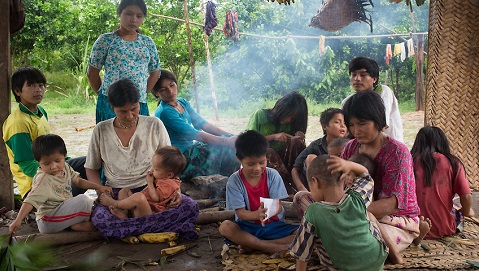Report calls for Indigenous Peoples' knowledge to be included in climate policy
A new report highlights how recognising Indigenous Peoples’ and local communities’ knowledge systems could do more to address climate change than many current approaches. It also argues for ensuring the full and equitable inclusion of Indigenous Peoples and local communities within policy processes.

The report, published as a white paper, was produced by an international team of 12 authors including Dr Victoria Reyes-García ICREA research professor at the Institute of Environmental Sciences and Technology of the Autonomous University of Barcelona (ICTA-UAB), in Spain, and Dr Neil Dawson from the University of East Anglia in the UK, and five Indigenous scholars.
Co-sponsored by the Intergovernmental Panel on Climate Change (IPCC), The United Nations Educational, Scientific and Cultural Organization (UNESCO) and the International Council on Monuments and Sites (ICOMOS), the initiative was a response to growing calls for international attention to be given to culture in climate change science and policy.
The authors draw on diverse literature and case studies to illustrate why recognition of Indigenous Peoples’ and local communities’ knowledge systems would add much to western scientific approaches and represent a needed transformative change from current efforts.
It is often assumed that climate change responses must involve new technology or behavioural changes driven by governments and big companies. However, the authors say such approaches are based on a very western, scientific understanding of problems and of top-down solutions.
“There is a growing consensus that we are not responding to climate change with the necessary speed or effectiveness. To meet this challenge, we urgently need to understand the problem from a different perspective. Indigenous Peoples' values and worldviews have much to contribute,” explains Rosario Carmona, research fellow at the Research Centre for integrated Disaster Risk Management in Chile.
The knowledge systems held by the world’s 400 million Indigenous Peoples, plus many local, traditional communities, bring alternative ways of understanding and proven, bottom-up means of addressing complex global problems, such as climate change and biodiversity loss. However, counterproductively, many Indigenous Peoples and local communities continue to suffer social, political, and economic discrimination - often including violence and displacement from their territories - and are most affected by environmental and climate change.
Dr Dawson, Research Fellow at UEA’s School of International Development and one of the report’s lead authors, said: “Respecting the human rights of Indigenous Peoples, their territories and their knowledge could do far more to address climate change than many proposed solutions.
“It's shocking that this would represent such a huge change, but this report shows that diverse worldviews need much more recognition in climate politics and science."
The examples detailed in the report include the contribution of Mapuche spirituality to climate change mitigation in Chile, customary processes guiding coastal village relocation in Fiji, local water management knowledge in the Spanish Sierra Nevada, and Indigenous fire management practices for forest conservation in Bolivia.
It also examines the resilience associated with traditional stone walling for agriculture in the Cordillera Region of the Philippines, local flood risk management in informal settlements in Sierra Leone, and Indigenous knowledge in urban settings, such as the San Francisco Bay area and Phoenix Valley in the United States.
Enhanced collaboration between western science and these diverse knowledge systems has been increasingly called for in international reports, as a way to enhance the effectiveness of climate action.
“Put simply, many international bodies now recommend far more prominent roles and opportunities for Indigenous leaders and representatives to influence decisions and commitments in global climate negotiations and national level climate strategies,” said Dr Reyes-García, ICREA Professor at ICTA-UAB.
“But, as the report illustrates, this is not so quick and easy to achieve. Knowledge systems are highly complex, rooted in differing worldviews and values. Although sometimes assumed to be outdated and not relevant to the modern world, Indigenous knowledge systems are active, dynamic, contemporary, and highly resilient.”
Knowledge systems not only include values, such as spiritual beliefs and connections to nature, but also ways of deciding, organising and actively governing, managing and caring for land and resources. They play a crucial role in sustainably managing much of the world’s critical ecosystems, species and resources.
The report - titled ‘Intangible cultural heritage, diverse knowledge systems and climate change’ - outlines steps to be taken towards enhanced recognition of Indigenous and local knowledge systems, such as full, secure rights to Indigenous territories and languages, respect for rights, and highlights characteristics of more equitable collaboration.
Developing intercultural understanding, trust and appropriate governance processes can take years and goes against many assumptions and entrenched ways of addressing environmental crises, but the report says this is essential for sustaining ecosystems and people.
At local levels more effective climate action could be achieved through securing rights to Indigenous territories and supporting customary institutions. National climate strategies and Nationally Determined Contributions should include customary governance and local stewardship as vehicles for delivering sustainable emissions levels.
At an international level, the United Nations Framework Convention on Climate Change (UNFCCC) should elevate the role of the Local Communities and Indigenous Peoples Platform (LCIPP) and facilitate more direct resourcing of Indigenous Peoples and local communities to support the application and resilience of diverse knowledge systems.
In addition, the assessment processes of the IPCC should include more Indigenous scholars as assessment authors/lead authors, use wider forms of citation and case studies for the upcoming Assessment Round 7 and beyond, and more evidence synthesis related to the roles played Indigenous Peoples and local communities through their traditional but evolving systems.
The report is available here.